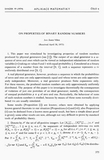Article
Full entry |
 PDF
(1.4 MB)
Feedback
PDF
(1.4 MB)
Feedback
 PDF
(1.4 MB)
Feedback
PDF
(1.4 MB)
Feedback
Summary:
Let $\{X_k\}^\infty_{k=1}$ be a sequence of independent zero-one random variables (rv) with $P(X_k=1)=\frac{1}{2} + \Delta$. Then we define the binary random number (brn) $Y=\sum^\infty_{k=1} X_k2^{-k}$. An ideal generator produces 0 and 1 with equal probability, but a real one does it only approximately. The purpose of this paper is to find distribution of brn for $-\frac{1}{2}<\Delta <\frac{1}{2}$ (also $\Delta =\Delta_k$). Particularly, convergence of the normed sum of brn to normally distributed rv is studied by means of Edgeworth expansion.
References:
[1] Г. А. Козлов: О распределении случайных чисел, вырабатываемых последовательными физическими датчиками. Теория вероятностней 16 (1971) 370. Zbl 1168.35423
[2] M. Kаc: Statistical Independence in Probability Analysis and Number Theory. Carus Mathematical Monograph, No. 12 The Mathematical Association of America, 1959. MR 0110114
[3] Jessen-Wintner: Distributions and the Riemann Zeta functions. Trans. Amer. Math. Soc. 38, 48-88 (1935). DOI 10.1090/S0002-9947-1935-1501802-5 | MR 1501802
[4] В. В. Петров: Суммы независимых случайных величин. Москва 1972. Zbl 1156.34335

